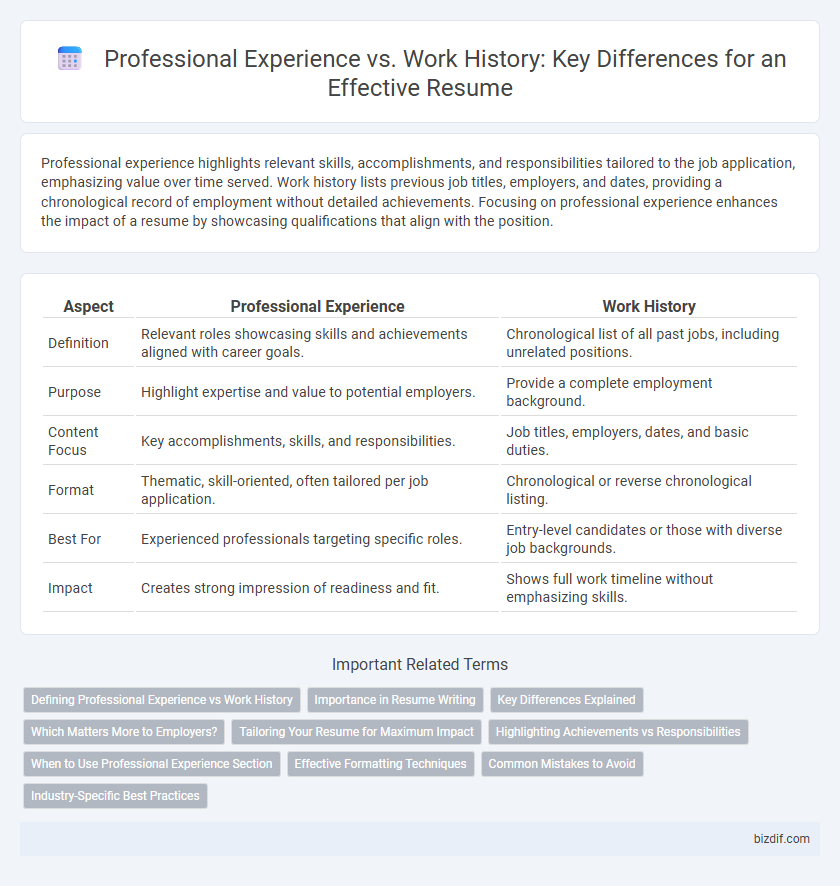Professional experience highlights relevant skills, accomplishments, and responsibilities tailored to the job application, emphasizing value over time served. Work history lists previous job titles, employers, and dates, providing a chronological record of employment without detailed achievements. Focusing on professional experience enhances the impact of a resume by showcasing qualifications that align with the position.
Table of Comparison
| Aspect | Professional Experience | Work History |
|---|---|---|
| Definition | Relevant roles showcasing skills and achievements aligned with career goals. | Chronological list of all past jobs, including unrelated positions. |
| Purpose | Highlight expertise and value to potential employers. | Provide a complete employment background. |
| Content Focus | Key accomplishments, skills, and responsibilities. | Job titles, employers, dates, and basic duties. |
| Format | Thematic, skill-oriented, often tailored per job application. | Chronological or reverse chronological listing. |
| Best For | Experienced professionals targeting specific roles. | Entry-level candidates or those with diverse job backgrounds. |
| Impact | Creates strong impression of readiness and fit. | Shows full work timeline without emphasizing skills. |
Defining Professional Experience vs Work History
Professional Experience refers to relevant roles and achievements directly related to a specific career or industry, emphasizing skills and accomplishments that demonstrate expertise. Work History encompasses all previous employment regardless of relevance, listing positions held along with dates and basic job duties. Defining Professional Experience highlights targeted career growth, while Work History provides a comprehensive employment timeline.
Importance in Resume Writing
Professional Experience highlights relevant skills, accomplishments, and roles directly related to the job applied for, making it crucial for demonstrating value to employers. Work History lists all previous jobs chronologically but may include unrelated positions that dilute the resume's impact. Emphasizing Professional Experience ensures a targeted, results-oriented resume that aligns with employer expectations and boosts chances of interview selection.
Key Differences Explained
Professional Experience highlights relevant skills, accomplishments, and responsibilities directly related to the target job, emphasizing quality over quantity. Work History lists all previous positions chronologically, providing a comprehensive employment timeline without detailed achievements. Understanding these key differences helps tailor resumes to showcase strengths effectively and meet employer expectations.
Which Matters More to Employers?
Employers prioritize Professional Experience over Work History because it highlights relevant skills, accomplishments, and industry-specific expertise directly linked to the job role. Work History simply lists previous positions and dates, offering little insight into the candidate's value or growth potential. Demonstrating measurable impact and proficiency in Professional Experience sections boosts a resume's effectiveness in capturing employer interest.
Tailoring Your Resume for Maximum Impact
Tailoring your resume for maximum impact involves emphasizing Professional Experience over a basic Work History by highlighting relevant achievements, skills, and contributions aligned with the job description. Incorporating quantifiable results and industry-specific keywords optimizes applicant tracking system (ATS) performance and captures recruiter attention. Customized Professional Experience sections demonstrate value and expertise, making your resume stand out in competitive job markets.
Highlighting Achievements vs Responsibilities
Professional experience sections emphasize quantifiable achievements and specific contributions that demonstrate value to potential employers, while work history primarily lists job duties and roles chronologically. Highlighting accomplishments, such as exceeding sales targets or leading successful projects, differentiates candidates by showcasing impact rather than just task execution. Employers prioritize results-driven narratives as they better predict future job performance and organizational fit.
When to Use Professional Experience Section
The Professional Experience section should be used when highlighting relevant skills and accomplishments that directly align with the job you're targeting, emphasizing results and responsibilities over mere employment dates. This section is ideal for candidates with a consistent career path who want to showcase their expertise and impact in previous roles. Use the Professional Experience section to demonstrate industry-specific achievements that make you a strong fit for the position.
Effective Formatting Techniques
Professional Experience sections emphasize accomplishments and skills using action verbs, quantifiable results, and tailored bullet points, enhancing readability and impact. Work History typically lists job titles, employers, and dates, often in reverse chronological order, but may lack detail and engagement. Effective formatting techniques for resumes include clear headers, consistent font styles, bullet points for easy scanning, and strategic use of white space to highlight key professional experiences over mere job listings.
Common Mistakes to Avoid
Confusing professional experience with work history often leads to listing irrelevant job duties instead of showcasing accomplishments aligned with the target role. Avoid including excessive detail on every position held; instead, emphasize measurable results and skills that demonstrate growth and industry relevance. Neglecting to tailor this section for each application reduces overall resume impact and decreases interview opportunities.
Industry-Specific Best Practices
Professional experience emphasizes relevant roles, responsibilities, and achievements tailored to the target industry, highlighting skills directly applicable to the position sought. Work history lists chronological job titles and dates without necessarily showcasing industry-specific competencies or accomplishments. Industry-specific best practices recommend structuring resumes by professional experience to demonstrate expertise, measurable results, and alignment with sector expectations, enhancing applicant tracking system (ATS) compatibility and recruiter appeal.
Professional Experience vs Work History Infographic

 bizdif.com
bizdif.com